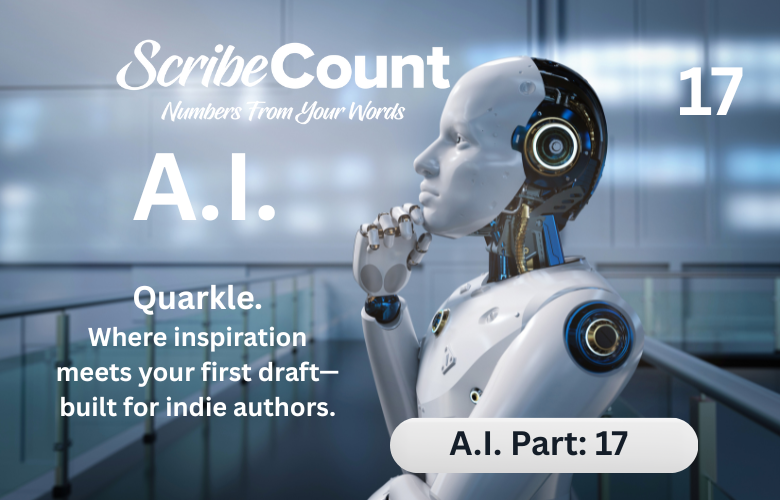Quarkle for Indie Authors
In the ever‑expanding universe of tools at an independent author’s disposal, Quarkle has quietly carved its niche as a platform that unites idea discovery, research synthesis, and creative writing assistance into one seamless environment. Designed to reduce the friction between inspiration and execution, Quarkle offers a suite of features—from AI‑powered prompts to integrated fact‑checking and structuring tools—enabling indie authors to draft, refine, and plan stories with fewer context switches. This essay explores how Quarkle evolved from a research lab experiment to a full‑featured author companion, profiles the founders and their vision, unpacks how its features serve indie storytellers, examines integrations with writing workflows, navigates cost and learning‑curve considerations, evaluates key trade‑offs, and ultimately concludes with a strong recommendation for authors seeking both exploration and structure in their craft.
Origins and Evolution
Quarkle began life in 2021 as a side project among data‑science researchers working on knowledge‑graph retrieval and prompt engineering. The initial spark came when one of the team’s members—a speculative‑fiction writer by evening—grew frustrated with switching among search engines, note‑taking apps, writing tools, and brainstorming dashboards. What if a single environment could integrate idea generation, fact‑checking, outline drafting, and writing space?
Early versions of Quarkle focused on “idea surfing”—a feature that generated concept clusters from seed prompts. By mid‑2022, the team opened a limited private beta, allowing writers to test generative prompts, built‑in research windows that sourced facts from web‑validated databases, and a minimalist drafting canvas. In 2023, Quarkle secured seed investment to scale its knowledge‑graph back end and add long‑form composition tools. A public launch in early 2024 introduced features specifically tailored to novelists: multi‑character sheets, plot‑arc templates, worldbuilding wikis, and one‑click export to Markdown or Word.
By 2025, Quarkle had grown into a multiplatform web app with tens of thousands of indie‑author users. It evolved from a research toy to a creative workflow engine—balancing generative creativity with structured note‑taking, fact‑checking, and export tools that align with common self‑publishing pipelines.
The Visionaries Behind Quarkle
The founders are a small cross‑disciplinary team combining AI research, library sciences, UX design, and independent publishing. Lead co‑founder and CEO Priya Das holds a PhD in knowledge‑graph engineering and spent years working in digital‑library search engines before turning to fiction writing. CTO Lucas Meng transitioned from building recommendation systems to improving generative‑AI pipelines, while product lead and UX specialist Sara Ahmad came from ed‑tech, focusing on intuitive tools for creative professionals.
Their shared mission: keep authors in flow by reducing context switches, embedding discovery within creation, and supporting narrative structure without enforcing a rigid outline. They envisioned Quarkle as a sandbox that moves right from inspirational sparks to final paragraphs, with research, plotting, and drafting steps all accessible in one fluid interface.
Core Features for Indie Authors
Idea Surfing and Brainstorming
Authors begin with a central idea—“a haunted library,” “second‑chance romance in space,” “heist with AI protagonists”—and Quarkle generates clusters of related concepts, character archetypes, setting prompts, conflict beats, and potential twists. That brainstorming pane stays live as authors explore, tag, or refine prompts into outlines or story fragments.
Research and Fact‑Checking
Quarkle integrates vetted public‑domain and free‑to‑use datasets, alongside automated web‑lookup features. Authors can query historical timelines, geography facts, or science‑based world‑building details from within the same interface. Facts are cited inline, letting authors write accurate descriptions (Era: 1890s New Orleans, or orbital habitats) without flipping browser tabs or losing creative momentum.
Structured Outlining and Worldbuilding
Within a nested sidebar, authors create chapter outlines, map character arcs, track setting evolution, and build a world wiki—connecting characters to locations to key events. Scene cards can be rearranged visually, and progress bars attached to each scene track drafting completion.
Drafting Canvas and Version Control
The writing editor is Markdown‑friendly, distraction‑free, and autosaves in the cloud. Each scene or chapter has its own canvas with revision snapshots, so authors can fork, branch, or restore earlier takes before merging changes. Inline comments and tagging keep track of open items (e.g., “Research astronomy term here,” or “Fix dialogue tone.”)
Marketing‑Adjacent Tools
Although not a full marketing suite, Quarkle offers AI‑assisted generation of blurbs, meta‑descriptions, headline drafts, synopsis paragraphs, and keyword suggestions tied to genre categories. It can prepare a back‑cover blurb by summarizing key plot arcs, or suggest hashtag lists for social promotion based on genre conventions.
Export and Integration
Once drafts are ready, Quarkle exports manuscripts chapter by chapter as Markdown or Word. It also outputs a structured metadata file including character lists, setting summaries, and generated taglines, suitable for use in publishing platforms. Its API supports automated export into Scrivener, Vellum, or publishing toolchains via Zapier or custom scripts.
Integrations in the Indie Workflow
Quarkle sits comfortably alongside tools like Scrivener (for deep drafting), Vellum (for final formatting), and ChatGPT or Claude (for deeper rewriting or dialog polishing). Authors often begin in Quarkle for ideation and structure, then export into Scrivener for long‑form composition, using Quarkle’s metadata for project notes. Quarkle’s backlink‑style wiki entries can sync via Markdown files into Git‑backed vaults like Obsidian for persistent worldbuilding. It lacks direct plugin integration with some cover‑design apps, but its export and API layers make it compatible with most self‑publishing pipelines.
Pricing, Learning Curve, and Options
Quarkle
offers a tiered model. A freemium plan includes brainstorming, limited
research queries, and drafting up to a few chapters. The Creator plan ($15/month) unlocks full worldbuilding tools, export limits, and extended revision history. The Pro plan ($30/month)
adds API access, advanced knowledge‑graph backups, team collaboration,
and priority support. Annual subscriptions discount by roughly 20%.
Authors with only basic drafting needs adapt quickly—within a couple hours. Deeper feature mastery, like fact‑checking workflows or API automation, may take a few days of tutorials. Quarkle’s interface emphasizes inline tips and mini‑guided tours, so authors without technical backgrounds can still leverage its full drafting and research capabilities.
Strengths and Trade‑Offs
Quarkle’s primary strength lies in its blend of ideation, structured outlining, and embedded fact‑checking. For authors exhausted by toggling among search tabs, note apps, and writing docs, it condenses flow into one workspace. The live collaboration features and revision snapshots support small writing teams or author–editor partnerships. It keeps story logic and facts at hand without enforcing rigid planning models.
On the downside, Quarkle doesn’t generate images, charts, logos, QR codes, or full marketing automation like outreach scheduling or cover design. Its AI‑support for editing (rewrites, grammar tuning) is serviceable, but authors often still export to dedicated editing or AI‑writing assistants for polish. Pricing, while competitive, may feel steep for authors only needing brainstorming and basic drafting. Offline editing is not yet supported, and heavy research users may bump into rate limits on fact‑queries without upgrading.
Final Thoughts and Recommendation
For indie authors who prize integrity of narrative, love to alternate between wild brainstorming and disciplined structure, and want embedded fact‑checking without context switching, Quarkle stands out. It doesn’t replace your prose polishers or marketing suites, but it accelerates the phase where ideas seed outlines, characters grow arcs, and scenes crystallize into draft paragraphs. Paired with specialist tools—AI rewriting platforms like ChatGPT for stylistic polish, Vellum for formatting, and external tools for cover design—it forms a central creative engine.
In mid‑2025’s ecosystem, Quarkle earns strong praise for its fusion of ideation, research, and drafting under one roof. Indie authors looking to reduce friction between inspiration and execution will find Quarkle a compelling partner on their self‑publishing journey.

